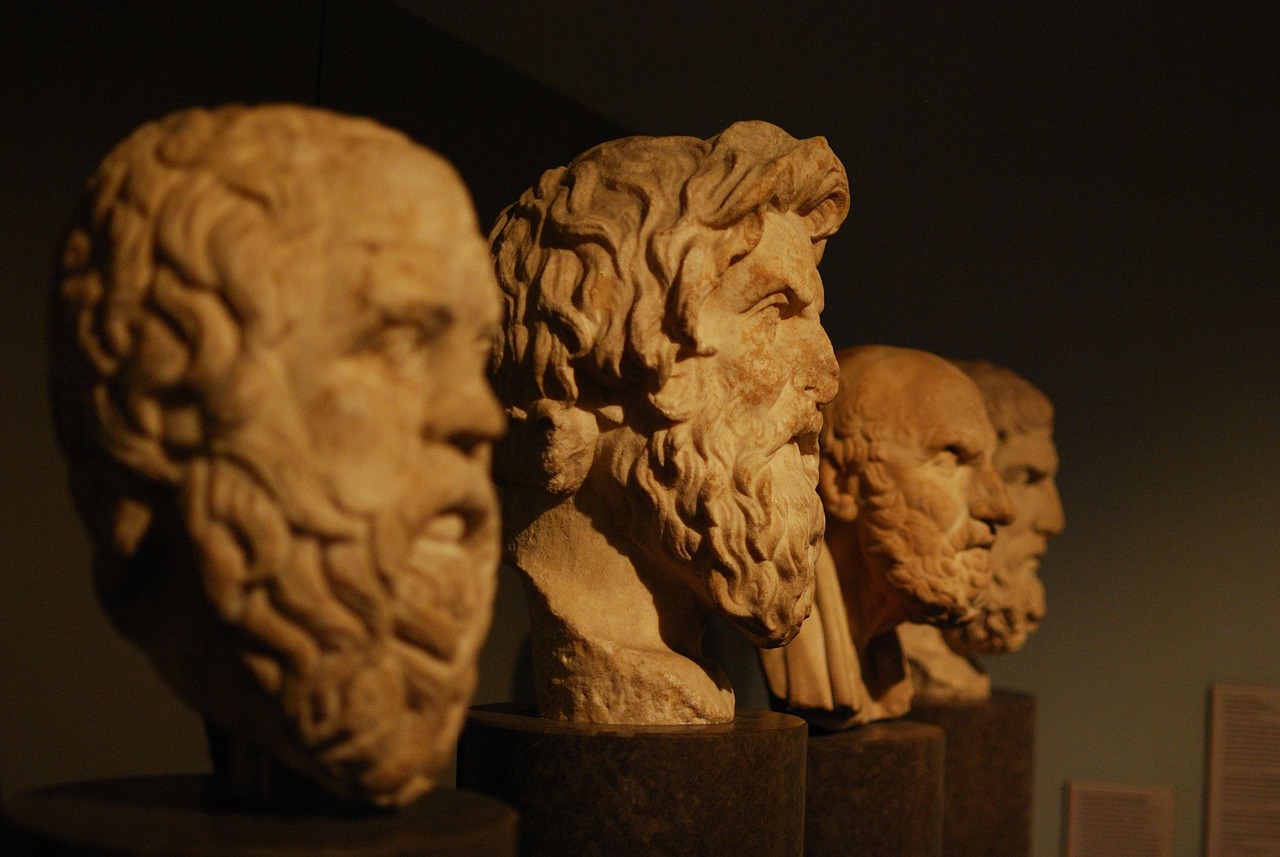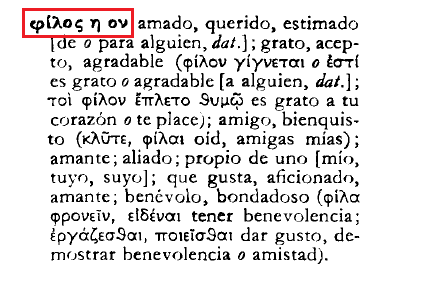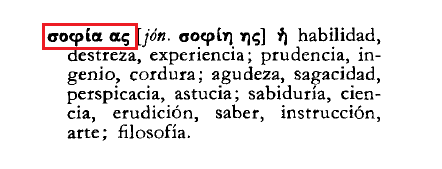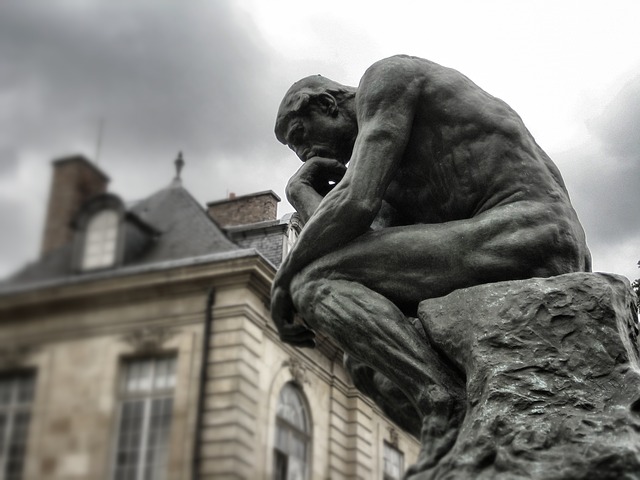#Philosophizing (Part I) About Philosophy and its link to knowledge

All men by nature desire to know.
With this line Aristotle starts his Metaphysics.
Before moving on, I’d like to talk a little bit more about what we could understand by Philosophy.
Because of my academic training I’ve always been kind of reluctant to let myself be guided by “Pocket dictionary definitions” when I try to understand a certain word that is, by its own nature, complex: Philosophy is one of these words. I find it impossible to grant it one single meaning that would turn out to be brief, concise and complete (like on pocket dictionaries) and that, at the same time, it won’t end up demeanishing or mutilating it’s meaning. Or multiple meanings.
In my opinion, to define a word is a highly complex task, and sometimes we take that for granted, however, I think that with a bit of exploration we could get closer to finding a satisfying definition.
(I only own a Greek-Spanish Dictionary, oops!)
On the spanish text
On the spanish text
On the spanish text
Going beyond etymology
For example, to Plato and Aristotle Philosophy was a pure science; to The Stoics and The Epicureans it was rather an aspiration to happiness or virtue (although for Aristotle the path of science naturally leads to happiness), and there are others to which philosophy relates to the “science of all principles”.
Regardless of this heterogeneity, it is possible to distinguish a trait of universality in every philosophical system. If anything has defined every philosopher and philosophical system that has ever existed is that “desire to know” that we mentioned at the beginning. The attitude of philosophers before the world, before the totality of the objects that surround them (this is what we mean by universality), is and has always been an intellectual attitude, meaning, an attitude of thought.
Philosophers try to know, they wish to know, this is why we can directly link Philosophy to knowledge.
I want to make a section just here to mention that I consider (along with many philosophers more structured and important than me) that thought is not separated from action.
We tend to judge that everything that is related to "thinking", such as philosophy, is "useless" for the practical or "real" world, because we believe that thought and action are independent of each other, and this is not the case. At least, not in my opinion. Think about it, there is nothing done in the world that has not been thought of before; no action has been performed, no act, no object has been created before being mediated by thought. It is not that thought precedes action or vice versa, as some philosophers of previous centuries affirmed, but that thought cannot be without action, and action cannot be without thought. They are correlative, and we take this for granted.
Why did I just ramble about Philosophy and knowledge?
Now that we’re getting into subject I’d like to clarify (better late than never) that this whole blabbering about philosophy and knowledge has been my way of giving you some context on the new section of content that I want to develop here on Steemit. I’ve named it #Philosophizing, because hasthags make everything look more fun and more accessible hahaha
There is also a Spanish version of this section, called #Filosofando
As some of you might now because I’m always talking about myself, I studied Philosophy in university, and although I do not practice my career at all and I really have many years without dedicating myself to it, properly speaking, it is something I find exciting. I work at a school and one of the subjects I teach is called Theory of Knowledge. The program is not precisely Philosophy, but I do enjoy bringing up philosophical and epistemological issues with my students.
I'd like to dedicate a few of my future posts to the reflection on knowledge and knowledge issues that I've remembered thanks to my classes and my students. For this I must rediscover my relationship with Philosophy.
So… what is Philosophy, then?
Going back to Aristotle, and his Natural Philosophy, which he considered Science of Being qua Being, this is, the highest science, we could say that Philosophy aims to the knowledge about the essence of things, the connections between them and the ultimate principle of reality. In that regard, to Aristotle, Philosophy is oriented to a conception of the universe. It wont be exactly like that to every philosopher.
To Socrates, for example, who is considered the father of Western Philosophy, this one has more to be with a conception of the (Greek) spirit, because he considered that human life should be oriented to the reflection on knowledge, and that every human action should be a conscious action, then it can be considered proper knowledge. Only like this life could be elevated, in every aspect, to philosophical consciousness. This vision of Philosophy is also evident in Plato. Here we find it more developed, of course (let’s remember that there is no physical register of Socrates' works, and that it was Plato who systematized what he had learned of his master in his own work) and converted into self-reflection of the spirit about theoretical and practical virtues and values, in other words: about the way that mankind lives and comes to be in the world.
This is what defines a man or woman of philosophy… That has a lot to do with “the practical real world”, doesn’t it?
“We could define the essence of philosophy as the self-reflection of the spirit on its theoretical and practical evaluative behavior, and at the same time, as an aspiration to the knowledge of the last connections between things, to a rational conception of the universe - J. Hesen.

Well, that’s enough for today. I hope I did not bore you to death hahaha and hopefully you found something somewhat interesting about it.
I guess I’ll have to set my stupid academic pride aside (yes, it is stupid) and actually do a bit of a "Pocket Dictionary" task to be able to explain in a general, brief and concise way many of these problems, but I will try to be as less reductionist as possible.
Very humbly, I would like to share with you some things that I am passionate about and that have influenced my life and my way of thinking so much. I would also like to be able to contribute to "debugging" (that sounds horrible, I know… ) the Philosophy tag, which, although it is full of interesting personal reflections, I consider that they make an inappropriate use of the word…
I’m mainly interested in dusting off a lot of knowledge and skills that I no longer use often, and if along the way I can get you interested in the subject, and I can help you discover in philosophy something more than boring or useless stuff, well, then it’ll be worth it.
.gif)
What do you think? What is/was your opinion on Philosophy? Has your way of thinking about it changed after reading this? Share it with me on a comment below! I welcome any kind of constructive feedback.
- If you wish to know more about the subject I teach, click here.
- Is there any specific content you’d like to see on my profile? Let me know in the comments!
- The Thinker image source is from: Pixabay



Wow! You know you're shit. I just learned a LOT! I do believe I will enjoy any and every post you put in #Philosophizing and I look forward to participating in it as well. BRAVO!
Awww thank you so much! <3 I'm so glad to read this! I look forward to your participation :D cheers!